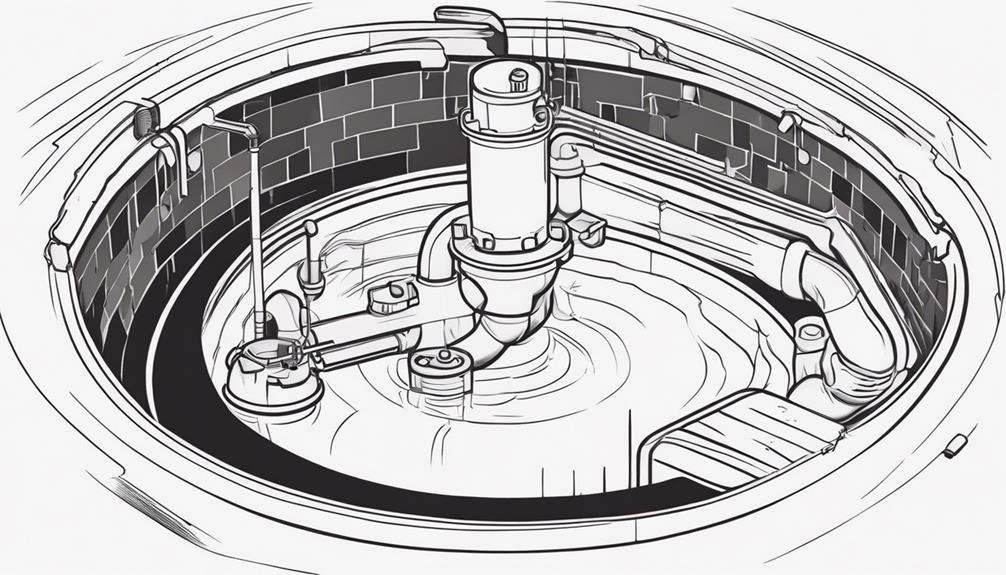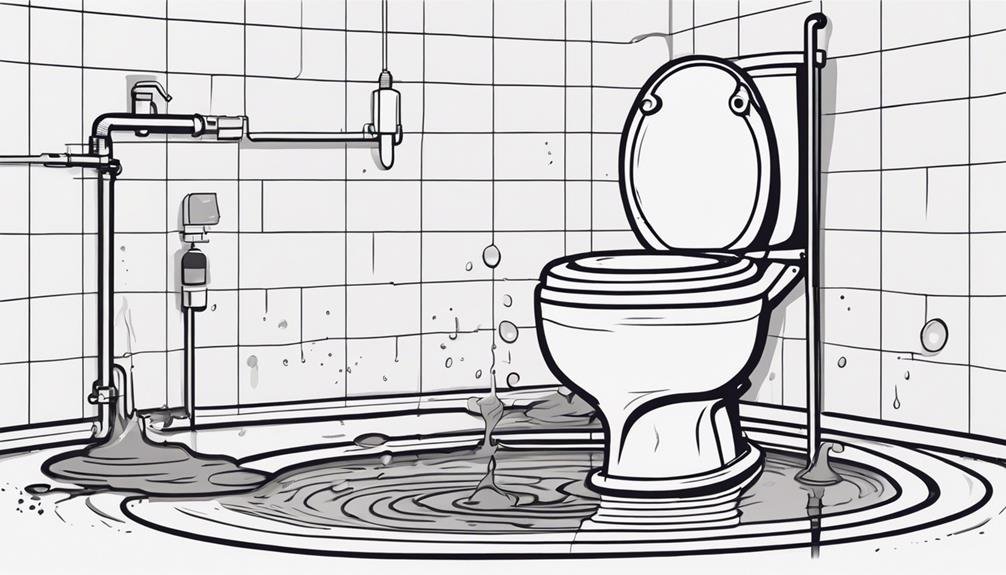Imagine waking up to find sewage backing up into your bathtub, causing a foul smell and a messy cleanup.
Septic system backup prevention matters because it not only safeguards your home and property but also protects your health and the environment.
Let's explore the steps you can take to avoid such unpleasant situations and ensure the smooth operation of your septic system.
Key Takeaways
- Regular maintenance and professional services prevent costly backups and ensure efficient septic system operation.
- Early detection of backup issues through signs and inspections is crucial for timely prevention.
- Preventing backups safeguards public health, the environment, and extends the septic system's lifespan.
- Investing in backup prevention now saves on future repair and replacement costs while maintaining system effectiveness.
Importance of Regular Maintenance

Regular maintenance of your septic system is crucial to prevent backups and ensure proper functioning. By conducting DIY maintenance tasks regularly, such as inspecting the tank for leaks, checking the drain field for any signs of issues, and pumping the tank when needed, you can avoid costly emergency repairs and keep your system running smoothly.
Performing routine maintenance not only helps in identifying potential problems early but also extends the lifespan of your septic system. Simple tasks like being mindful of what goes down the drains, conserving water, and avoiding flushing non-biodegradable items can significantly reduce the risk of backups.
In addition to DIY maintenance, it's essential to schedule regular inspections by a professional to assess the overall health of your septic system. These inspections can catch any issues before they escalate, saving you from unexpected emergency repairs and ensuring that your system continues to operate efficiently. Remember, prevention through regular maintenance is key to a trouble-free septic system.
Key Factors for Backup Prevention
To prevent septic system backups effectively, implementing proper waste disposal practices is paramount. Root infiltration poses a significant risk to your system. Tree roots seek out moisture and can infiltrate pipes, causing blockages and potential backups. To mitigate this risk, avoid planting trees or large shrubs near your septic system and regularly inspect and trim existing vegetation.
Another crucial factor in backup prevention is understanding your tank capacity. Overloading the system with excessive water usage can lead to backups. Be mindful of your household's water consumption habits, especially during peak times. Consider installing water-saving fixtures and spreading out laundry and dishwasher usage to prevent overwhelming the system.
Regularly scheduled maintenance, such as routine inspections and pump-outs, can help identify and address potential issues before they escalate. By staying proactive and mindful of these key factors, you can significantly reduce the likelihood of septic system backups and ensure the proper functioning of your system.
Signs of Potential Backup Issues

Effective monitoring of your septic system's performance can help you identify early signs of potential backup issues. Early detection is crucial for prevention.
One of the warning signs to watch out for is slow draining sinks, toilets, or showers. If you notice gurgling sounds coming from your drains, it could indicate a developing issue. Foul odors around your yard or near the septic tank area are also red flags that shouldn't be ignored.
Lush, green patches of grass over the drain field might seem harmless but can indicate a problem with the system. Taking action steps promptly upon noticing these signs is essential to prevent backups.
Schedule an inspection with a professional to assess the situation and address any underlying problems. Regular maintenance, proper waste disposal, and being mindful of what goes down your drains can all contribute to a healthy septic system and reduce the risk of backups.
Professional Pumping Services Benefits
Engage professional pumping services to ensure optimal septic system function and longevity. When it comes to maintaining your septic system, relying on expert pumping services can provide numerous benefits that contribute to the overall efficiency and effectiveness of your system.
Here are three key reasons why investing in professional pumping services is crucial:
- Regular Maintenance: Professional pumping services help in preventing backups and other issues by regularly emptying the septic tank, ensuring that it operates smoothly without any blockages that could lead to system failure.
- Emergency Response: In the event of a sudden problem such as a backup or overflow, professional pumping services offer emergency response capabilities to address the issue promptly, minimizing damage and inconvenience.
- System Efficiency: By removing accumulated sludge and scum from the septic tank, professional pumpers improve the overall efficiency of the system, allowing it to function optimally and extending its lifespan.
Opting for professional pumping services is a proactive approach to maintaining your septic system's health and avoiding costly repairs in the long run.
Frequently Asked Questions
Can I Use Household Chemicals to Clean My Septic System and Prevent Backups?
You shouldn't use household chemicals to clean your septic system as they can disrupt the natural balance of bacteria. Instead, opt for septic-safe alternatives. DIY solutions like enzyme treatments are effective and pose fewer risks to your system.
Are There Any Environmental Benefits to Preventing Septic System Backups?
Preventing septic system backups offers significant environmental benefits. By avoiding overflows, you conserve water quality, protect ecosystems, and prevent pollution. It's a crucial step in maintaining a healthy balance and sustainability in your surroundings.
How Often Should I Have My Septic Tank Inspected for Potential Issues?
For optimal septic system function, have your tank inspected every 3-5 years by a professional. Routine maintenance can prevent costly issues. Stay proactive to ensure your system operates efficiently and avoid potential backups.
Are There Any DIY Methods for Preventing Septic System Backups?
To prevent septic system backups, maintain drains by avoiding clogs with regular cleaning. Install grease traps to catch oils and fats. DIY methods involve being mindful of what goes down the drain to prevent costly backups.
Can Landscaping or Tree Roots Cause Septic System Backups?
Landscaping hazards, such as tree roots, can indeed cause septic system backups. Root intrusion into pipes can lead to clogs and damage, disrupting the system's function. Regular inspection and proper landscaping planning are essential for prevention.
Conclusion
In conclusion, maintaining your septic system is crucial to prevent backups and costly repairs. By regularly scheduling professional pumping services and being aware of key factors like excessive water usage and tree roots, you can avoid potential issues.
Remember, a stitch in time saves nine – taking proactive measures now will save you from a messy situation later on. Stay informed, stay proactive, and keep your septic system running smoothly for years to come.

